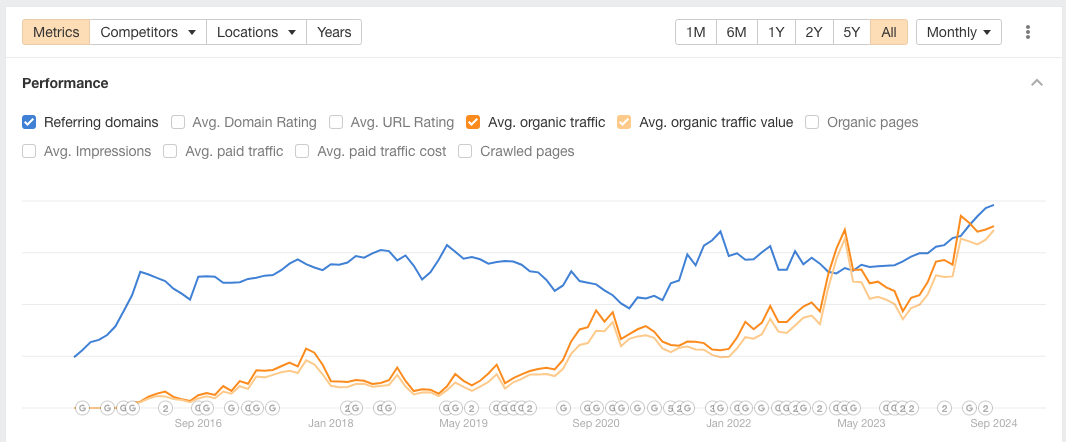Link Building
Guest Post Services
10+ years experience in building guests posts for Australian businesses
Getting an SEO agency to handle guest posting isn't just about boosting your brand's visibility long-term. It's also a chance to connect with big names that your audience already knows and loves. Doing all this on your own can eat up a lot of time and money. That's where a link building agency comes in handy, taking the load off your plate so you can focus on what you do best.

Achieve Long-Term Online Success
With Our Guest Posting Services
Guest posting packs a punch when it comes to boosting your brand. Firstly, it gets your name out there, reaching new audiences and establishing you as an expert in your field. Plus, it’s a great way to score some serious SEO points. Those backlinks from reputable sites? They tell search engines you’re the real deal, helping you climb up those search results. But it’s not just about the numbers; guest posting opens doors for collaborations and partnerships. Building connections with other movers and shakers in your industry can lead to exciting opportunities down the road. And let’s not forget about the direct traffic it brings. When people like what they see in your guest posts, they’re more likely to check out your site and become loyal fans. So, if you want to expand your reach, boost your credibility, and grow your business, guest posting is where it’s at.
Why Are guest posts Services Important?
Guests posts and Blogger Outreach are among the critical parts of an all-encompassing digital marketing strategy. They represent effective methods for generating quality external links, assuring organic traffic and building relevant contacts for future growth. By generating quality backlinks and connecting with industry leaders, your online presence acquires higher credibility among both your consumers and search engines.
Signals from relevant websites (links that lead back to your pages) make a huge difference in search rankings. However, getting those quality backlinks is a complex and time-consuming process to be deployed without top SEO experts. Four Dots‘ guests posts Sydney department has 10+ years of experience in the field of off-site SEO, while our link building services involve the following processes:
Market Research
Identifying industry influencers and relevant contacts.
Industry Monitoring
Getting to know your specific niche, the bloggers and the topics they like.
Outreach & Engagement
Establishing contact via the appropriate channel (mail, social networks, etc).
Creating a Quality Backlink Pool
Your website gets numerous backlinks from reputable sites and platforms and a boost in rankings and brand credibility.
Link Management & Maintenance
Once your link is created, it shouldn’t be forgotten. We make sure that your domain rating continues to rise.
Get in contact
Contact us now and we'll start working right away on taking your online presence to a whole new level!
Get quoteValue for your Brand
The modern age of mass blogging, both personal and corporate, has made it much more difficult to get your voice heard and grow as a brand. Guest posts Services are deployed across all industries and niches, and the competition has never been tighter. This means that getting a high-quality backlink that will help you rank higher has become either impossible or downright expensive.
But for a link-building agency that already knows all the tricks of the trade that this SEO method hides, creating links of high quality is our favourite domain (sorry for the pun). A single backlink can lead to a higher search position in Google’s results. Why not use this to your advantage?
LET US GET YOU TO THE TOP ONE BACKLINK AT A TIME!
Four Dots, an SEO agency from Sydney, has been proudly collaborating with hundreds of small and large companies worldwide. We use our 10+ years of experience to help them achieve lift-off with their online presence. We are capable of tailoring SEO strategies according to your own needs, goals and resources, and subsequently scale everything up as your business starts to grow. If you’re struggling to improve your revenue stream through online channels, we offer you the assistance that will make this process faster and much easier.
We support Australian businesses with link building to get them results like this:


We have been working with Four Dots for a while now. So pleased with their professional approach to the digital space. I can trust their advice and guidance. Highly recommend.
Rachel Bramblett / Network Plumbing
Guest Posts FAQs
Depending on how you wish to work with us we can do this in a few different ways, we can create competitor outreach campaigns, where we look at websites your competitors have and work to find out where they have built links and get links on the same websites. We can also look at the DR range of websites, niches and create outreach campaigns to create links on websites which are niche relevant, have a strong DR and have organic traffic.
If you’re after a quantity based campaign we can further expand to similar niches and lower DR websites.
Potential websites are based on Niche, Domain Rating, Organic Traffic, Top level domain i.e. .com.au .co.uk and competitors link profile. We can work on specific SLA’s as well depending on the client.
Yes and each campaign will have specific goals which may influence how these metrics are reviewed.
We have not had a penalty in over 7 years of link building, we also have a team who work on penalty removals and linkspam monitoring. If we feel like the link building will become unnatural then links will be throttled or built for brand rather than target keywords. We will also consult with clients who dont have good enough content for links to be built to their sites and suggest content creation such as blogs, whitepapers and infographics which would be more likely to attract links.
Usual timelines is every month, although as its manual outreach some can be quicker and some can be delayed, this is why we prefer to work with clients on ‘campaigns’ which go for a time period vs link orders, but we can accommodate most types of delivery.
As we do not own the websites where the links are created we cannot guarantee this, what we can guarantee is a replacement period for links if they do ‘go down’.
We can work together on this, although it may influence prices when the links become harder to obtain.
Proudly provide services to



















Latest from the blog
Advanced Technical SEO Tactics for 2025
As the digital landscape continues to evolve, staying ahead in SEO requires more than just basic optimisation techniques. Technical SEO is important as it impacts organic traffic, search result appearance, user experience, and overall SEO performance. Advanced technical SEO tactics are essential for ensuring your website remains competitive and ranks well in search engine results. […]
Read moreShopify SEO – How to Optimize Your Shopify Site for Google
Having a Shopify store is great, but if people can’t find it on Google, you’re missing out on potential sales. SEO (Search Engine Optimisation) is key to driving organic traffic to your Shopify store. With the right strategies, you can boost your rankings, attract more customers, and grow your business. In this guide, we’ll take […]
Read moreBoost Your Conversions Transform Your Landing Pages In Just 14 Days
In today’s digital world, your landing page is often the first thing people see when they visit your site. If it’s not up to scratch, you could be losing potential customers before they even get to know your business. But don’t worry – with the right tweaks, you can turn your landing page into a […]
Read moreSydney office
Level 26, 44 Market Street,
NSW 2000
Sydney,
Australia
Phone +61 289993731




